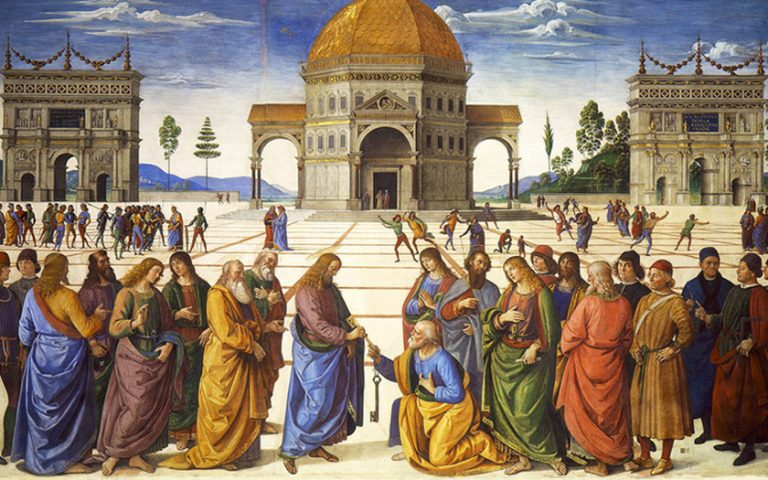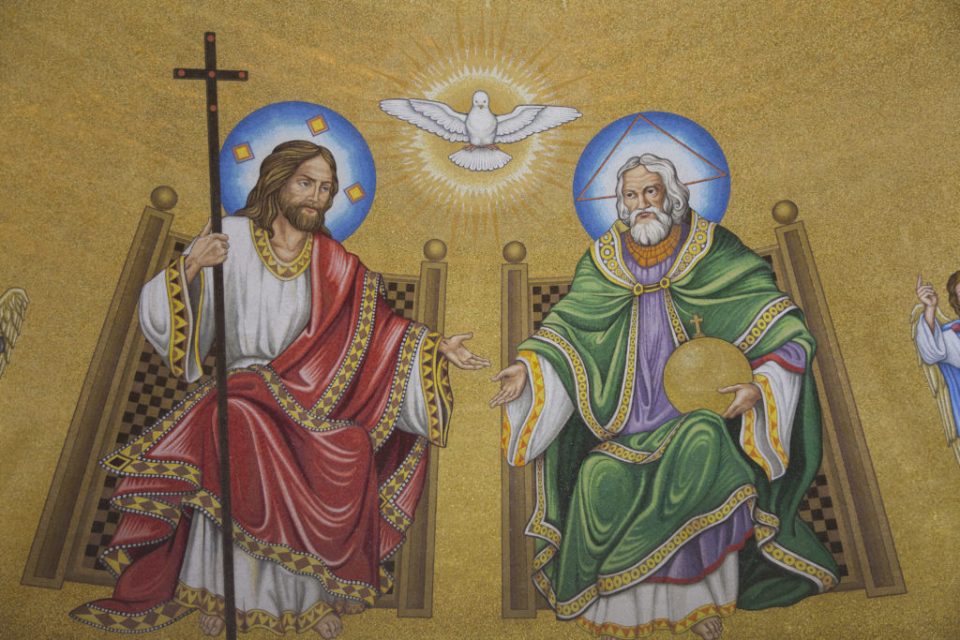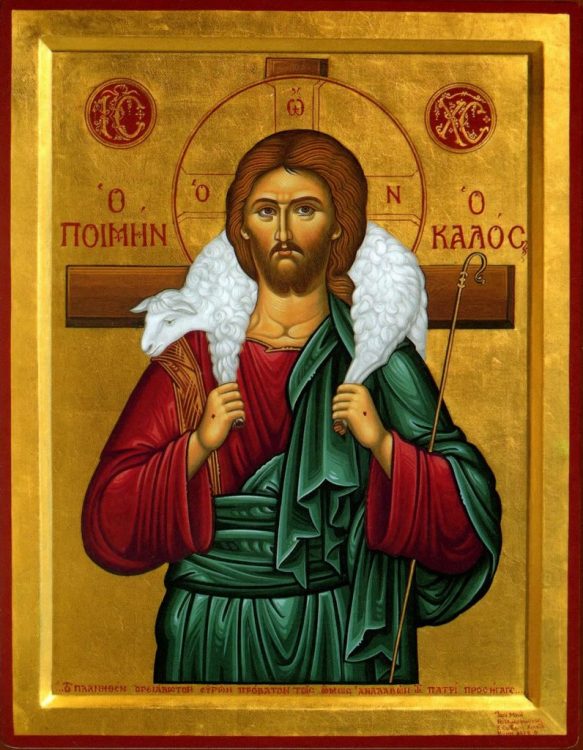Daily Reading & Meditation: Friday (February 22)

Overcoming a Credibility Crisis, by Janet Smith
February 22, 2019
Planned Parenthood President: We Kill Babies Because “We Believe in Life. It’s Being Pro-Life”
February 22, 2019
The keys of the kingdom of heaven
Author Don Schwager – Scripture: Matthew 16:13-19 (alternate reading: Mark 8:34 – 9:1)
13 Now when Jesus came into the district of Caesarea Philippi, he asked his disciples, “Who do men say that the Son of man is?” 14 And they said, “Some say John the Baptist, others say Elijah, and others Jeremiah or one of the prophets.” 15 He said to them, “But who do you say that I am?”16 Simon Peter replied, “You are the Christ, the Son of the living God.” 17 And Jesus answered him, “Blessed are you, Simon Bar-Jona! For flesh and blood has not revealed this to you, but my Father who is in heaven. 18 And I tell you, you are Peter, and on this rock I will build my church, and the powers of death shall not prevail against it. 19 I will give you the keys of the kingdom of heaven, and whatever you bind on earth shall be bound in heaven, and whatever you loose on earth shall be loosed in heaven.”
Meditation: At an opportune time Jesus tests his disciples with a crucial question: Who do men say that I am and who do you say that I am? He was widely recognized in Israel as a mighty man of God, even being compared with the greatest of the prophets, John the Baptist, Elijah, and Jeremiah. Peter, always quick to respond, exclaimed that he was the Christ, the Son of the living God. No mortal being could have revealed this to Peter, but only God.
Cyril of Alexandria (376-444 AD), an early church father comments on Peter’s profession of faith in Jesus:
Peter did not say “you are a Christ” or “a son of God” but “the Christ, the Son of God.” For there are many christs [meaning anointed ones] by grace, who have attained the rank of adoption [as sons], but [there is] only one who is by nature the Son of God. Thus, using the definite article, he said, the Christ, the Son of God. And in calling him Son of the living God, Peter indicates that Christ himself is life and that death has no authority over him. And even if the flesh, for a short while, was weak and died, nevertheless it rose again, since the Word, who indwelled it, could not be held under the bonds of death. (FRAGMENT 190)
Jesus plays on Peter’s name which is the same word for “rock” in both Aramaic and Greek. To call someone a “rock” is one of the greatest of compliments. The ancient rabbis had a saying that when God saw Abraham, he exclaimed: “I have discovered a rock to found the world upon”. Through Abraham God established a nation for himself. Through faith Peter grasped who Jesus truly was. He was the first apostle to recognize Jesus as the Anointed One (Messiah and Christ) and the only begotten Son of God. The New Testament describes the church as a spiritual house or temple with each member joined together as living stones (see 1 Peter 2:5). Faith in Jesus Christ makes us into rocks or spiritual stones.
Jesus then confers on Peter authority to govern the church that Jesus would build, a church that no powers would overcome because it is founded on the rock which is Christ himself. Epiphanius, a 6th century Scripture scholar who also translated many early church commentaries from Greek into Latin, explains the significance of Jesus handing down the “keys of the kingdom”:
For Christ is a rock which is never disturbed or worn away. Therefore Peter gladly received his name from Christ to signify the established and unshaken faith of the church.… The devil is the gateway of death who always hastens to stir up against the holy church calamities and temptations and persecutions. But the faith of the apostle, which was founded upon the rock of Christ, abides always unconquered and unshaken. And the very keys of the kingdom of the heavens have been handed down so that one whom he has bound on earth has been bound in heaven, and one whom he has set free on earth he has also set free in heaven. (INTERPRETATION OF THE GOSPELS 28)
The Lord Jesus offers us the gift of unshakeable faith, enduring hope, and unquenchable love – and the joyful boldness to proclaim him as the one true Savior who brings us the kingdom of God both now and forever. Who do you say he is to yourself and to your neighbor?
“Lord Jesus, I profess and believe that you are the Christ, the Son of the living God. You are my Lord and my Savior. Make my faith strong like Peter’s and give me boldness to speak of you to others that they may come to know you personally as Lord and Savior and grow in the knowledge of your great love.”
Psalm 23:1-6
1 The LORD is my shepherd, I shall not want;
2 he makes me lie down in green pastures. He leads me beside still waters;
3 he restores my soul. He leads me in paths of righteousness for his name’s sake.
4 Even though I walk through the valley of the shadow of death, I fear no evil; for you are with me; your rod and your staff, they comfort me.
5 You prepare a table before me in the presence of my enemies; you anoint my head with oil, my cup overflows.
6 Surely goodness and mercy shall follow me all the days of my life; and I shall dwell in the house of the LORD for ever.
Daily Quote from the early church fathers: Who do people say that the Son of Man is? by John Chrysostom (347-407 AD)
“Note that he is not asking them their own opinion. Rather, he asks the opinion of the people. Why? In order to contrast the opinion of the people with the disciples answer to the question ‘But who do you say that I am?’ In this way, by the manner of his inquiry, they might be drawn gradually to a more sublime notion and not fall into the same common view as that of the multitude.
“Note that Jesus does not raise this question at the beginning of his preaching but only after he had done many miracles, had talked through with them many lofty teachings, and had given them many clear proofs of his divinity and of his union with the Father. Only then does he put this question to them.
“He did not ask ‘Who do the scribes and Pharisees say that I am?’ even though they had often come to him and discoursed with him. Rather, he begins his questioning by asking ‘Who do men say the Son of man is?’ as if to inquire about common opinion. Even if common opinion was far less true than it might have been, it was at least relatively more free from malice than the opinions of the religious leaders, which was teeming with bad motives.
“He signifies how earnestly he desires this divine economy to be confessed when he says, ‘Who do men say the Son of man is?'” for he thereby denotes his godhead, which he does also in many other places. (excerpt from THE GOSPEL OF MATTHEW, HOMILY 54.1.6)
Meditations may be freely reprinted for non-commercial use – please cite: copyright (c) 2019 Servants of the Word, source: www.dailyscripture.net, Author Don Schwager
Scripture quotations from Common Bible: Revised Standard Version of the Bible, copyright 1973, and Ignatius Edition of the Revised Standard Version of the Bible, copyright 2006, by the Division of Christian Education of the National Council of the Churches of Christ in the United States of America. Used by permission. All rights reserved. Citation references for quotes from the writings of the early church fathers can be found here.
Go to | Daily Reading & Meditation Index |
The Daily Scripture Readings and Meditations is in need of on-going development to expand resources and to reach people around the world. If you would like to contribute, you can make an online donation. |




